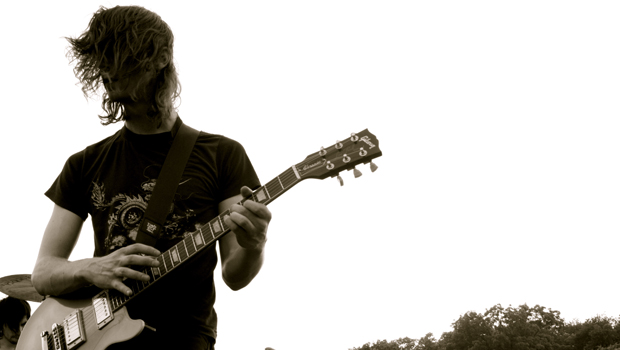All the latest guitar news, interviews, lessons, reviews, deals and more, direct to your inbox!
You are now subscribed
Your newsletter sign-up was successful

It just so happens that when we recently caught up with Russian Circles to chat about the state of post-rock in Chicago, the band had just entered the studio to begin work on the follow-up to 2009’s Geneva.
GuitarWorld.com was able to break the news of a new Russian Circles album earlier this week, and now -- as promised -- we bring you the full interview with Russian Circles guitarist Mike Sullivan.
GUITAR WORLD: People tend to use terms like post-rock and post-metal to describe the music of Russian Circles. How do you feel about the use of those terms?
MIKE SULLIVAN: I understand why people use those terms. When we started, we weren’t aware of those genres, really. We were familiar with bands like Tortoise and Sigur Ros but never thought they were post-rock - just that we kind of liked that stuff.
It wasn’t until we started playing that people started saying, “Oh, you’re a post-rock band, and here are other post-rock bands like you guys.” The thought never occurred to us.
I think our influences come from more '90s instrumental bands: Shellac, Don Caballero, that sort of stuff, more than contemporary instrumental music. The reference post for post-rock is different for us than what other people consider it to be.
But you never set out to be a "post-rock" band.
All the latest guitar news, interviews, lessons, reviews, deals and more, direct to your inbox!
Yeah, we never decided to be a post-rock or post-metal band, but everybody likes to label something just for convenience.
If you had to describe the sound of Russian Circles to someone who had never heard the band's music, what would you say?
Well, I hate to use terms, but at some point you have to. If I have to describe it to people who’ve never heard it, like my parents’ age or something, I would say we’re a mixture of Metallica and Pink Floyd.
But that’s kind of a poor man’s excuse out of it; you’re missing the nuances of the music. It’s kind of hard to describe your own music without sounding like a jerk [laughs].
You guys are from Chicago, which has become sort of an unofficial home for heavy, instrumental music these days -- you, Pelican, Tortoise. What is it about the city that’s proven so fertile for this kind of music?
Despite it being a big city, it’s a pretty close-knit group of musicians; everyone’s helping everyone else out.
From the beginning, Pelican – they’re friends of ours – they did everything they possibly could to help us and get us on shows and get on a label; not just pure nepotism, but just wanting to help the scene in Chicago. It’s not a very competitive scene.
How do you approach your role as a guitarist in Russian Circles? You’re definitely not your typical lead guitarist …
I see myself as a kind of liaison between the bass and drums. I don’t like to go too far out of the mix to take a solo or something like that because it can leave a gap in the music. We approach it by asking, “Is there a narrative here in the song, and, if so, who’s taking on the role of the narrator?” Or it might be a more rhythmic thing.
We try to start things very simple, make sure the groove is there, and once the groove is there we can start webbing out and exploring different ideas. Ideally, we try to keep it stripped down. If it gets too muddled, it’s time to go back to the drawing board.
The last record, Geneva, saw the band bringing in strings and brass as well as your moving away from the double-cutaway Les Pauls you’re known for. Can fans expect you to continue in this direction?
The string incorporation was something we always wanted to do but never had the time or money to make it happen in the studio. Thankfully, with Geneva we had enough time in the studio where we were allowed time to get together with the string players and get the arrangements worked out.
This album, so far, doesn’t have any strings; we’ve kept it stripped down, back to a three-piece sound so we can play it live, just like how we play it in the studio.
Are there any surprises fans can expect out of the new album?
I don't want to get too into it, but there are definitely things that are new to us, that we didn't really put thought into but just started happening in the writing process. We were more adventurous with our tones; it's a broader spectrum of tones.
- GW
The as-yet-untitled fourth album from Russian Circles is due out on Sargeant House in October.
Photo: Christian Reed
Josh Hart is a former web producer and staff writer for Guitar World and Guitar Aficionado magazines (2010–2012). He has since pursued writing fiction under various pseudonyms while exploring the technical underpinnings of journalism, now serving as a senior software engineer for The Seattle Times.

